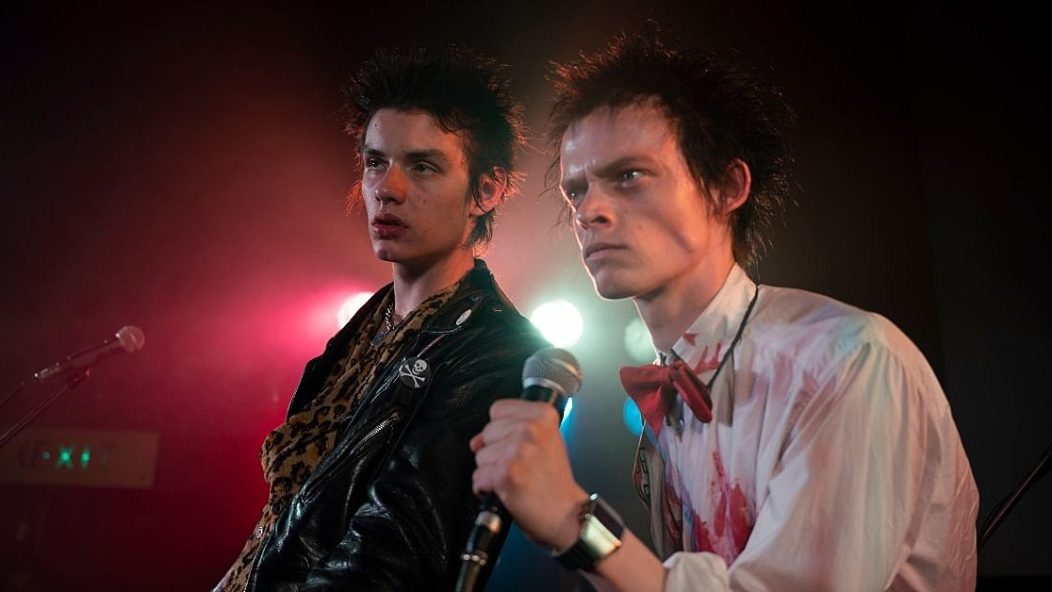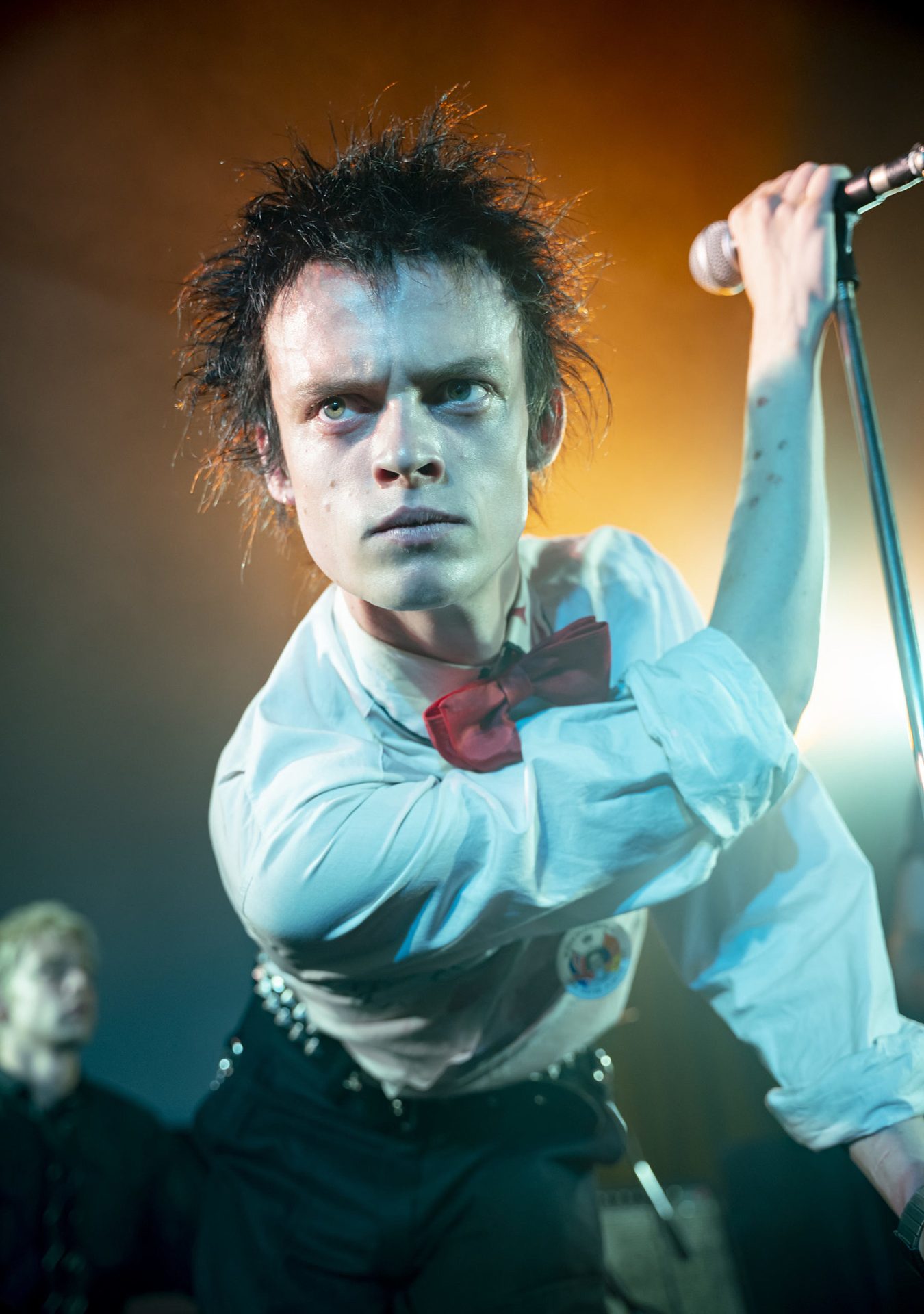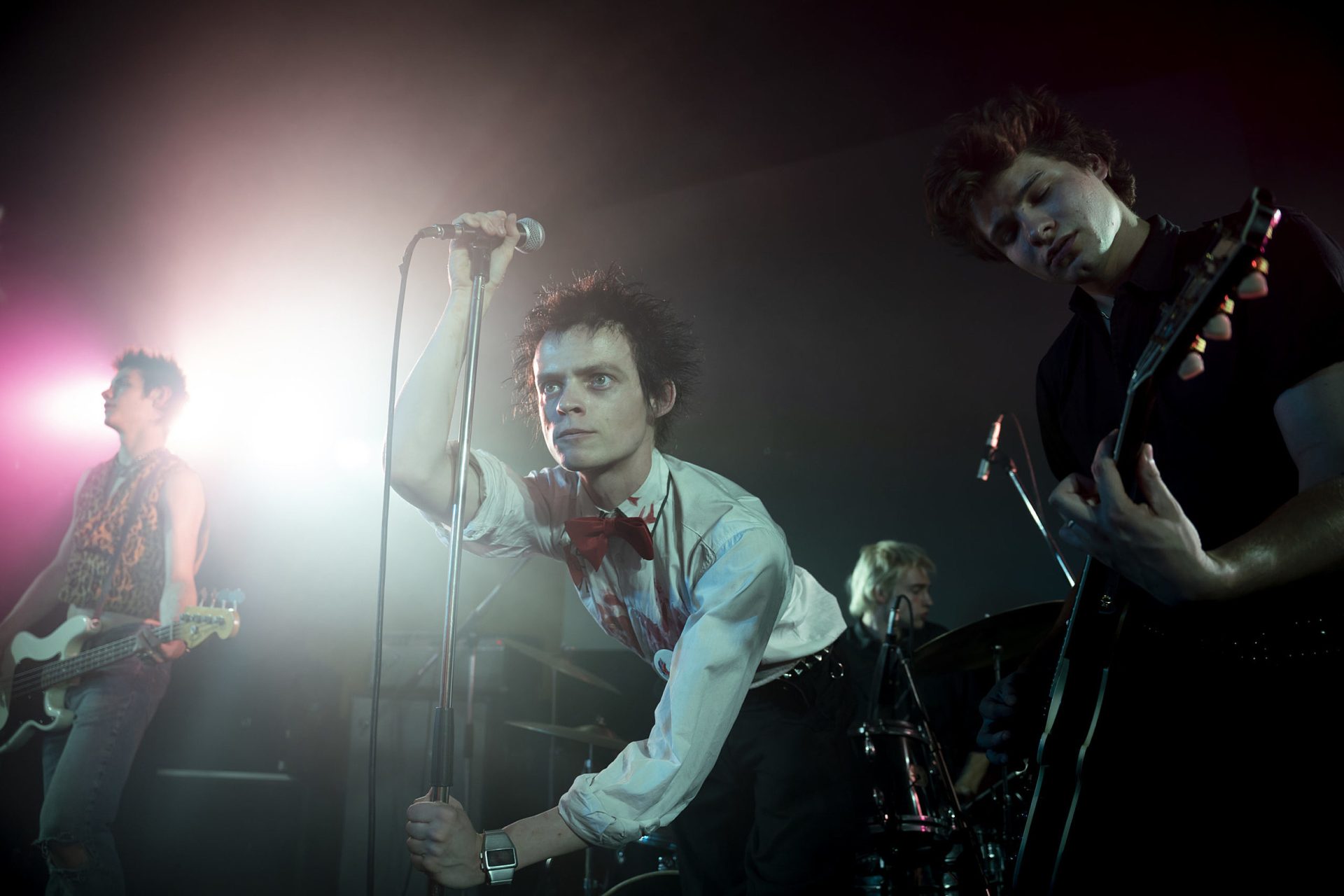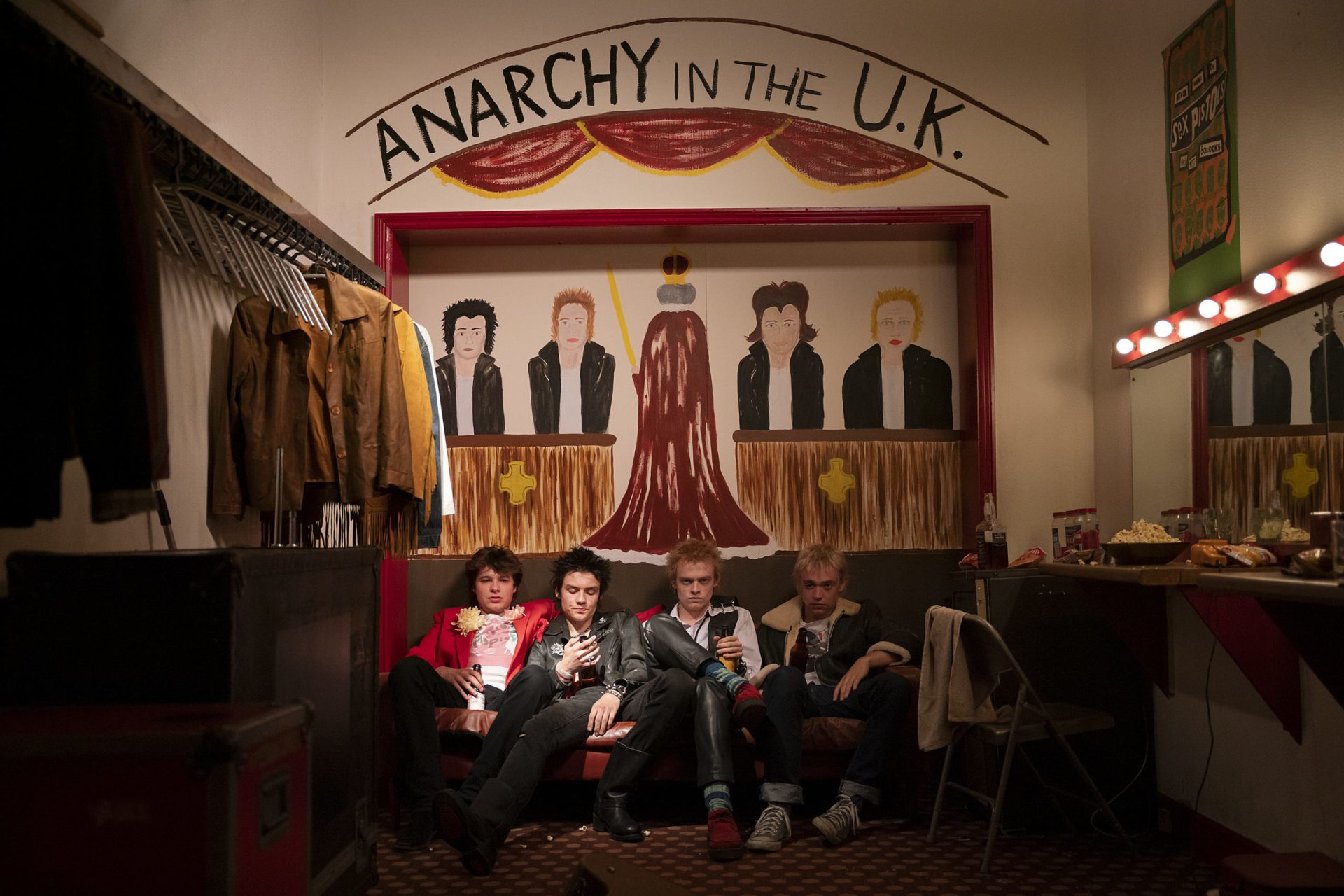
Why Danny Boyle's 'Pistol' proves the Sex Pistols were more than a rock band
Pistol, Hulu’s six-episode retelling of the Sex Pistols’ story through guitarist Steve Jones’ eyes, is hardly the first cinematic rendering of the life and times of England’s most notorious early punk-rock band. But it is the best.
Mind you, the competition is hardly fierce. The first, 1980’s The Great Rock ‘n’ Roll Swindle, was ostensibly a “documentary.” But Julien Temple’s directorial debut was more a classic British farce in the mold of the Carry On films, with manager Malcolm McLaren revising their story so his former clients were puppets he’d assembled to heist the music business. Which has perpetrated consistent misinformation that the most scandalous performers in British rock history were talentless frauds, sort of Milli Vanilli with huge guitar riffs and a dose of Situationist theory.
Read more: 15 artists influenced by the Sex Pistols, from Joy Division to Oasis
Temple made amends 20 years later by helming the band’s official documentary, The Filth And The Fury. Then there’s director Alex Cox’s darkly romantic Sid & Nancy, in which the Sex Pistols’ final nine months serve as a backdrop to the destructive myth of bassist Sid Vicious’ doomed twin relationships with girlfriend Nancy Spungen and heroin. Other than Gary Oldman’s astonishing performance as Vicious, which borders on reincarnation, it’s a footnote in the microgenre of Sex Pistols films at best.
So, what does it take to make a Sex Pistols movie that’s accurate enough to quash skeptics, with all the bone-crushing power of Jones’ white Les Paul Custom and Johnny Rotten’s blazing intensity? A script by Craig Pearce, based on Jones’ 2016 memoir Lonely Boy. Pearce has screen-written many of Baz Luhrmann’s most celebrated pictures, including Romeo + Juliet, Moulin Rouge! and the much-anticipated biopic Elvis. But Luhrmann’s extravagant way with celluloid is completely inappropriate for telling the tale of this band who disrupted British society, culture and music, then caused havoc in the rest of the world. Who films with the same rawness and rebelliousness heard in “Anarchy In The U.K.?” Simple: Danny Boyle, who’s made a career of interpreting slices of gritty Britannica into exceptional cinema since his whiplash 1996 adaptation of Irvine Welsh’s Trainspotting.

Read more: 20 greatest punk-rock vocalists of all time
They lay their manifesto in Pistol’s first 53 seconds, a blur of images illustrating the polarized extremes of 1973 British society, set to David Bowie guitarist Mick Ronson’s crushing “Moonage Daydream” chords. Queen Elizabeth II radiantly waves to crowds whose lights are dimmed by rolling blackouts. Bowler-hatted bankers in Saville Row suits quick-cut to dustmen pushing their carts alongside rushing traffic. Workers strike and overflowing garbage bags pile up along London streets. And Bowie-as-Ziggy Stardust appears in the middle, a blazing burst of Technicolor and joyful noise in the midst of England’s crumbling dream, in the D.A. Pennebaker-filmed footage from his July 3, 1973 “farewell concert” at the Hammersmith Odeon.
Then the screen fills with actor Toby Wallace as a teenage, pre-fame Jones, scaling the wall of the Hammersmith Odeon, shinnying through an open window and snipping cables to make off with the Spiders From Mars’ microphones. He also nabs a bass amp and some cymbals as a security guard sleeps. But not before striking a few Ziggy poses in front of Bowie’s center mic stand. Another minute in, the cinematic Jones mutters to Jacob Slater as drummer Paul Cook the very language the real Jones used in relating the tale to this writer in Alternative Press in 1989: “It still has Bowie’s lipstick on it!” Never mind the bollocks — here’s the most famous story of how the Sex Pistols’ guitarist stole all of their equipment.
Read more: These are the 20 best English punk songs
Boyle achieves his tone with much of his trademark toolkit: Archival footage intercut with new scenes lensed on period film stocks; dizzying montage; attention to the most microscopic details; a total willingness to get ugly with it. True, the Sex Pistols are occasionally romanticized, which is easy to do, especially if you grew up with their posters on your bedroom wall and their records on your turntable. Which many of the young actors did not. The Guardian recently reported that they even had to be instructed in how to hang a ‘70s-vintage telephone handset back in its cradle, having come of age with the cellphone. Boyle benefitted from having on hand many of the actual characters to technically advise, including executive producer Jones and iconic Sex/Seditionaries shop assistant Jordan Mooney.
But these actors are well cast, despite hardly resembling their real-life counterparts in most cases. Game Of Thrones actor Thomas Brodie-Sangster as McLaren looks to be about 14 years old, and Anson Boon barely resembles Rotten. But through assimilating their respective characters’ speech patterns and body language, they don’t merely suspend disbelief — they obliterate it. Brodie-Sangster is McLaren, inhabiting his fanciful manner of speaking. Boon particularly nails his role, withering sarcasm and all, while giving us glimpses of the underlying sensitivity that keeps Rotten from becoming an angry cartoon. We glimpse this most of all in the reenactment of his audition for the budding Sex Pistols. As he sings along to Alice Cooper’s “I’m Eighteen” in the backroom of Sex, this scared, insecure young man transforms into a seething parody of the standard-issue rock frontman. Perched before the mic stand, Boon becomes Rotten.
Read more: 11 bands influenced by New York Dolls, from Social Distortion to Guns N’ Roses
The real-life John Lydon has been openly dismissive and obstructive in Pistol’s production, even unsuccessfully suing to prevent usage of the Pistols’ music and his image. If his fear was of his portrayal in the series, he can rest easy. Boyle told The New York Times he hoped Pistol captured “the genius and the humility” of Rotten. It does, especially in episode 3, “Bodies,” centered around the real-life inspiration for the Pistols’ most scabrous track. Pauline, played by Bianca Stephens, is a “girl from Birmingham” discharged from an asylum, where she suffered abuse. She begins reclaiming her life after seeing the Pistols and begins stalking Rotten. In a touching scene near the end of the episode, he invites her into his parents’ flat for tea and conversation while it’s raining.

Both Wallace and Boon unveil their characters’ vulnerability and intense pain, which ultimately fueled the Sex Pistols’ blast-furnace rage. The delicate psychology driving them — their fragility, masked by angst and rage — is crucial. Hence the strained bond between the guitarist and the frontman is explored extensively. Beneath the mutual hostility and incomprehension, Jones and Lydon begrudgingly acknowledge each other’s respective genius. (An overly sentimental dream sequence in which the pair gain closure during a Jones drug episode is unnecessary, however.)
Read more: Watch the first teaser trailer for the David Bowie documentary ‘Moonage Daydream’
And what of Pistol’s main character? Wallace does a great job bringing to life the character who rose from a Shepherd’s Bush slum to become “England’s greatest guitar player,” as McLaren hypes him to Rotten in one scene. He captures Jones’ deeply wounded psyche, damaged by a multiply abusive stepfather, as well as his charmingly roguish front. But he also demonstrates Jones’ innate understanding of an England that had failed its citizenry, especially its young. Rotten could articulate this better, but these were ideas he shared with Jones. That common anger and frustration was the impetus for him to form, in Wallace’s words, “a band that represents the unrepresented.”
But Sydney Chandler’s head-turning performance as Chrissie Hynde practically steals the entire show. The actor fully absorbs the future Pretenders leader’s peculiar Ohio-meets-London speech patterns and spiky personality. Critical, considering she serves as a baseline for all six episodes. Pistol depicts Jones and Hynde as occasional lovers, musical soulmates and key friends. She watches from the sidelines as Jones obliterates all obstacles in shaking up British rock ‘n’ roll, feeling rather left behind. The tables are turned as the Pretenders rise in wake of the Sex Pistols’ dissolution and Jones’ descent into addiction, but she’s nowhere near as insensitive to him as he was to her.
Read more: Chrissie Hynde sees protest anthems and love songs as one and the same
Hynde is merely the strongest of many bold women inhabiting Pistol, including Game Of Thrones’ Maisie Williams’ utterly fearless Jordan, and Talulah Riley as Vivienne Westwood, imperiously presiding over Sex/Seditionaries as formidably as her real-life counterpart. Especially intriguing is Emma Appleton’s humanization of Spungen, the most universally reviled figure in Sex Pistols mythology. An American groupie whose hold on Vicious was ultimately his downfall, Appleton lays bare her mental illness. Placed in the context of an age when personality disorders weren’t understood the way they are now, Appleton elicits empathy for someone traditionally depicted as a cardboard villain.
Even more significant: Chandler nails Hynde’s singing — phrasing, vocal quality, range, nuance. In fact, the actors perform their own music live on film, with scarcely a single Pistols recording occupying the soundtrack. The schooling (including Wallace getting at least one guitar lesson from Jones) paid off. The cinematic Sex Pistols perfectly convey the real-life Pistols’ initial rawness and ramshackle charm, and eventual development into the live powerhouse they were. Curiously, viewers might think that the Pistols were the only punk band — no other peers/rivals such as the Clash or the Damned are mentioned.
Siouxsie And The Banshees are briefly glimpsed in performance, and the Pretenders are also briefly portrayed rehearsing “Brass In Pocket.” But that’s it. Pistol reenacts the band preaching the punk gospel across Britain, and how it affected the fans. But it says nothing of the countless groups formed in the Pistols’ wake.
Read more: 10 best ’70s London punk bands, from Siouxsie And The Banshees to Sex Pistols
Some of the time compression, condensation and fictionalization endemic to every film industry attempt at musical biopics are present. But it’s minimal next to most efforts. You won’t catch Jones playing an Epiphone rather than a Gibson. But Matlock is already present in the Swankers (the band’s original name) in episode 1, rather than being introduced to them by McLaren as his Saturday shop assistant as in real life.
The screen really catches fire in the musical performances, which blast from the screen with all the raw power and charisma of the real Sex Pistols. And recreations of certain historical moments — swearing on Bill Grundy’s tea-time talk show, for instance, or debuting on Tony Wilson’s So It Goes program — are otherworldly in their accuracy. The only time actual Pistols footage is used is during a montage of the 1978 U.S. tour, and it’s a rare misstep — it breaks suspension of disbelief. Pistol shouldn’t be mistaken for being a documentary, and seeing the actual band performing is jarring, dropped amid scenes of the televisual Pistols cavorting on the road.

Read more: 12 great standalone punk-rock singles, from the Clash to the Libertines
He showed Jones a belief in his unschooled vision, giving him the confidence he needed to make his dreams reality. Then he did Jones the biggest favor anyone could have: Informed him he was useless as a singer, but he might make a better guitarist than his mate Wally Nightingale (Dylan Llewellyn). Then he introduced the band to Lydon. He possessed more front than any of the nascent Pistols combined, blossoming into a street poet once Jones renamed him.
Many bloomed once exposed to the Sex Pistols’ overall message: “You don’t need permission for anything,” as Rotten voiced at the launch of their rendition of the Who’s “Substitute.” Boyle reiterated throughout his press interviews that the Pistols authorized their fans’ shattering the standard expectations of British society then.
“What the Sex Pistols introduced,” Boyle told The Guardian, “by their profanity and disrespect and vileness, was a break point that said: ‘No, you can do whatever the fuck you want with your life. If you want to waste it, waste it. Be vacant, be futile, be fucking hopeless, disgust everyone. But it’s yours — you do what you want with it.’ In retrospect, you realize that’s what made the difference — people never went back to that sense of stepping into your father’s shoes and following him into the factory.”
Read more: 20 greatest punk-rock guitarists of all time
In other words, that “no future” refrain in “God Save The Queen” was not a full stop. It means that unless you take your destiny into your own hands and make something of it, you will have no future. Could Pistol reignite that core message? Could it be reintroduced to a generation raised on cellphones, the internet and influencers? Perhaps. It’s a powerful work, about a force that rose from humble beginnings to blast through all hypocrisy. The Sex Pistols were so much more than a mere rock ‘n’ roll band, than “a guitarist who can’t play and a singer who can’t sing.” Pistol demonstrates how and why.










